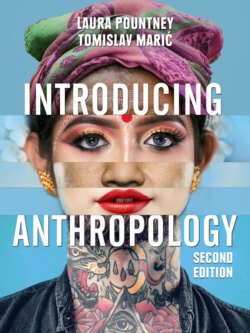Читать книгу Introducing Anthropology - Laura Pountney - Страница 91
An African ethnography of American anthropology (Mwenda Ntarangwi)
ОглавлениеAnthropologists are not only good at studying other cultures and communities in depth, they also frequently turn their analytical eye on themselves and their practices. They look at how their gender, race, social class, ethnic identity and other identity markers shape their ethnographic studies and the analyses they undertake of the data collected. This analytical look on themselves is the approach I have taken in my book Reversed Gaze: An African Ethnography of American Anthropology (2010). I present a side of Western anthropology that is not commonly accessed by many who read anthropological literature, even including that which is found in accounts of field experiences that culminate in reflexive ethnographies and memoirs that have now become standard contributions. My focus is anthropologists’ identities as they ‘practice’ anthropology within academic departments, professional meetings, classrooms and lecture halls, and through ethnographic writing, all of which constitute the ‘other side’ of anthropological practice that is often absent in scholarly papers, ethnographies and memoirs. To do this, I ask a number of questions, including the following:
1 How different are anthropologists’ lives at home in their own institutional and cultural contexts from their lives abroad while conducting the research that they subsequently share in their memoirs and ethnographies?
2 What part of the anthropologist’s identity revealed in ethnographies is shaped by their own culture and how can it provide a window to an understanding of the general work that anthropologists do?
3 How do students of anthropology navigate the challenges of ethnography while undergoing training in their own institutions before going ‘out’ into the ‘field’ to undertake their major ethnographic projects, and how might these projects inform each other?
4 Are mini-ethnographies, conducted at home to fulfil research methods course requirements, some kind of symbolic representation of dissertation fieldwork carried out in any field far away from the departments and institutions?
5 How do anthropologists interact at annual professional meetings and what does it say about anthropology as a discipline within the larger field of academic practice? Is the annual meeting a ritual similar to the cultural rituals analysed by anthropologists such as Clifford Geertz or Victor Turner? [See Chapter 9.] And to what extent do those rituals in professional meetings represent windows into understanding American anthropological culture?
My work does not present the undiluted culture of America and of anthropologists, but rather my understanding and interpretation of the ways and thoughts of individuals with whom I have interacted and of events that I have attended. This is not unlike many similar practices engaged in by anthropologists throughout their ethnographic research. My work is an account of how Americans and anthropologists with whom I have interacted have constructed what I consider to be a relatively consistent and shared set of actions, thoughts and beliefs that constitute a cultural logic that made sense to me. But, as anthropologists, we encounter other cultures against a backdrop of our own cultures and this in itself cannot be ignored in understanding the questions we ask, the conclusions we come up with or the topics and issues we seek to pursue. That is why I conclude that my book is as much about American anthropology as it is about my own cultural background; it is a conversation between two cultures and an analysis of key elements in the composition of that conversation within an anthropological frame.
